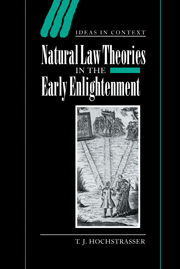Book contents
- Frontmatter
- Contents
- Preface
- 1 Introduction: natural law and its history in the early Enlightenment
- 2 Socialitas and the history of natural law: Pufendorf's defence of De Jure Naturae et Gentium
- 3 Voluntarism and moral epistemology: a comparison of Leibniz and Pufendorf
- 4 Christian Thomasius and the development of Pufendorf's natural jurisprudence
- 5 Natural law theory and its historiography in the era of Christian Wolff
- 6 Conclusion: the end of the ‘history of morality’ in Germany
- Bibliography
- Index
5 - Natural law theory and its historiography in the era of Christian Wolff
Published online by Cambridge University Press: 22 September 2009
- Frontmatter
- Contents
- Preface
- 1 Introduction: natural law and its history in the early Enlightenment
- 2 Socialitas and the history of natural law: Pufendorf's defence of De Jure Naturae et Gentium
- 3 Voluntarism and moral epistemology: a comparison of Leibniz and Pufendorf
- 4 Christian Thomasius and the development of Pufendorf's natural jurisprudence
- 5 Natural law theory and its historiography in the era of Christian Wolff
- 6 Conclusion: the end of the ‘history of morality’ in Germany
- Bibliography
- Index
Summary
J. F. BUDDEUS AND THE UNIVERSITY OF HALLE AFTER THOMASIUS
Thomasius' influence flowed as strongly, if more indirectly, through the next generation of pietist theologians at Halle and Jena, who had necessarily accepted Thomasian ethics as a subsidiary part of their education. Moreover, and crucially, they had also assumed Thomasius' fundamental categorical separation of moral philosophy and theology as intellectual disciplines with distinct histories and methodologies. It was largely the work of J. F. Buddeus (1667–1729) to develop Thomasius' writings in this particular direction. For Buddeus the modern natural law tradition was useful essentially for having provided a clear distinction between moral philosophy and moral theology. Pietists had held axiomatically that if Christian doctrine was ultimately grounded on faith and love then theology itself must similarly subdivide into dogmatic and moral theology. For Buddeus, Glaubenslehre and Sittenlehre are clearly distinct subjects for study: philosophia moralis takes its stand on reason, whereas theologia moralis takes revelation as its source of authority. It is moral theology that is decisive for the Christian, and therefore moral philosophy can only be a handmaid in the task of working out the correct pattern of behaviour owed by the individual Christian man or woman to God and his or her neighbour. Wolff's crime in the eyes of Buddeus was exactly that of having reversed these priorities.
Buddeus's ‘history of morality’ was both one of the first to be written and one of the most widely circulated.
- Type
- Chapter
- Information
- Natural Law Theories in the Early Enlightenment , pp. 150 - 186Publisher: Cambridge University PressPrint publication year: 2000



